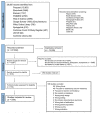Understanding COVID-19 Vaccine Hesitancy in the United States: A Systematic Review
- PMID: 39066385
- PMCID: PMC11281578
- DOI: 10.3390/vaccines12070747
Understanding COVID-19 Vaccine Hesitancy in the United States: A Systematic Review
Abstract
The COVID-19 pandemic has presented the importance of vaccination as a pivotal strategy for controlling its spread. However, vaccine hesitancy poses a significant barrier to achieving widespread immunization in the United States. This systematic review utilizes the 5C model to examine the factors contributing to hesitancy, which include confidence in vaccines, complacency about disease risk, calculations of individual benefit, convenience of vaccination, and collective responsibility for the protection of others.
Methods: We conducted a comprehensive search across several relevant databases and the gray literature, identifying 544 studies that used quantitative and qualitative methods to explore COVID-19 vaccine hesitancy in the general U.S.
Results: This review identifies a complex interplay of factors affecting hesitancy, such as concerns over vaccine safety and efficacy, misinformation and conspiracy theories, demographic variables, and socioeconomic conditions. Key strategies for increasing vaccine uptake include transparent and effective communication along with proactive community engagement.
Conclusions: To effectively mitigate vaccine hesitancy, it is crucial to understand its multifaceted causes. Tailored interventions that consider socioeconomic and cultural contexts and prioritize clear communication, community involvement, and specific strategies to address unique concerns can enhance vaccine acceptance.
Keywords: COVID-19 pandemic; United States; misinformation; mistrust; vaccination; vaccine acceptance; vaccine hesitancy; vaccine perceptions; vaccine safety; vaccine uptake.
Conflict of interest statement
The authors declare no conflicts of interest.
Figures



References
-
- World Health Organization WHO Coronavirus (COVID-19) Dashboard|WHO Coronavirus (COVID-19) Dashboard with Vaccination Data. [(accessed on 9 September 2023)];2023 Available online: https://covid19.who.int/
-
- Centers for Disease Control and Prevention COVID Data Tracker. U.S. Department of Health & Human Services. 9 April 2024. [(accessed on 9 April 2024)]; Available online: https://covid.cdc.gov/covid-data-tracker.
-
- Heintzelman C.A. The Tuskegee syphilis study and its implications for the 21st century. New Soc. Work. 2003;10:4–5.
Publication types
LinkOut - more resources
Full Text Sources

